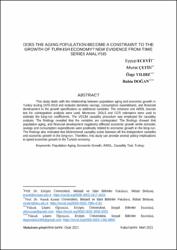| dc.contributor.author | Ecevit, Eyyup | |
| dc.contributor.author | Çetin, Murat | |
| dc.contributor.author | Yıldız, Özge | |
| dc.contributor.author | Doğan, Rabia | |
| dc.date.accessioned | 2022-05-11T14:33:26Z | |
| dc.date.available | 2022-05-11T14:33:26Z | |
| dc.date.issued | 2021 | |
| dc.identifier.issn | 1301-3688 | |
| dc.identifier.issn | 2630-6409 | |
| dc.identifier.uri | https://app.trdizin.gov.tr/makale/TkRVek1UYzJOZz09 | |
| dc.identifier.uri | https://hdl.handle.net/20.500.11776/7725 | |
| dc.description.abstract | This study deals with the relationship between population aging and economic growth inTurkey during 1970-2018 and includes domestic savings, consumption expenditures, and financialdevelopment in the growth specification as additional variables. The Johansen and ARDL boundstest for cointegration analysis were used. Moreover, DOLS and CCR estimators were used toestimate the long-run coefficients. The VECM causality procedure was employed for causalityanalysis. The findings revealed that the variables are cointegrated. The findings showed thatpopulation aging, and financial development negatively affected economic growth while domesticsavings and consumption expenditures were positively related to economic growth in the long-run.The findings also indicated that bidirectional causality exists between all the independent variablesand economic growth in the long-run. Therefore, this study can provide several policy implicationsto speed economic growth in the Turkish economy. | en_US |
| dc.description.abstract | Bu çalışma, Türkiye'de 1970-2018 döneminde nüfusun yaşlanması ile ekonomik büyüme arasındaki ilişkiyi ele almakta ve ek değişkenler olarak büyüme spesifikasyonunda yurt içi tasarrufları, tüketim harcamalarını ve finansal gelişmeyi içermektedir. Eşbütünleşme analizi için Johansen ve ARDL sınır testi kullanıldı. Ayrıca, uzun dönem katsayılarını tahmin etmek için DOLS ve CCR tahmin edicileri kullanıldı. Nedensellik analizi için VECM nedensellik prosedürüne başvuruldu. Bulgular, değişkenlerin eşbütünleşik olduğunu ortaya koymuştur. Sonuçlar, nüfusun yaşlanması ve finansal gelişmenin ekonomik büyümeyi olumsuz etkilediğini, yurtiçi tasarrufların ve tüketim harcamalarının ise uzun vadede ekonomik büyümeyle pozitif yönde ilişkili olduğunu göstermiştir. Ayrıca, uzun vadede tüm bağımsız değişkenler ve ekonomik büyüme arasında çift yönlü nedenselliğin var olduğunu göstermiştir. Bu nedenle, bu çalışma Türkiye ekonomisinde ekonomik büyümeyi hızlandırmada çeşitli politika uygulamaları sağlayabilir. | en_US |
| dc.language.iso | eng | en_US |
| dc.rights | info:eu-repo/semantics/openAccess | en_US |
| dc.title | Does the Aging Population Become a Constraint to the Growth of Turkish Economy? New Evidence From Time Series Analysis | en_US |
| dc.title.alternative | Yaşlanan Nüfus Türkiye Ekonomisinin Büyümesine Engel Oluyor Mu? Zaman Serisi Analizinden Yeni Kanıtlar | en_US |
| dc.type | article | en_US |
| dc.relation.ispartof | Erciyes Üniversitesi İktisadi ve İdari Bilimler Fakültesi Dergisi | en_US |
| dc.department | Fakülteler, İktisadi ve İdari Bilimler Fakültesi, İktisat Bölümü | en_US |
| dc.identifier.volume | 0 | en_US |
| dc.identifier.issue | 58 | en_US |
| dc.identifier.startpage | 367 | en_US |
| dc.identifier.endpage | 397 | en_US |
| dc.institutionauthor | Çetin, Murat | |
| dc.identifier.trdizinid | TkRVek1UYzJOZz09 | en_US |



















